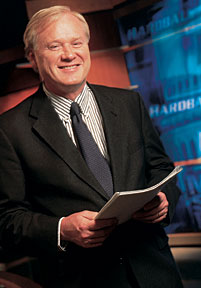
Chris Matthews talked to Senator John McCain of Arizona (R-Ariz.), one of the leaders on the Senate deal to limit filibusters for use only under "extraordinary circumstances."
Sen. McCain on preserving filibuster
In an interview with MSNBC's Chris Matthews, Senator John Mccain explains the politics behind the bipartisan deal
TRANSCRIPT EXCERPT
Updated: 11:45 a.m. ET May 24, 2005
MSNBC’s Chris Matthews talked to Senator John McCain of Arizona (R-Ariz.), one of the leaders on the Senate deal to limit filibusters for use only under "extraordinary circumstances."
Matthews asked McCain how he helped put together this bipartisan agreement, and whether or not he still has presidential plans. Below is an excerpt of that interview:
SEN. JOHN MCCAIN (R-Ariz.): We, I think, have an agreement that's good for the Senate and good for the country. And this will reduce the filibusters to almost—to—except under “extraordinary circumstances.” This will allow the nominations, three pending, Owen, Brown, and Pryor, to go through, because of their commitment. And we Republicans have committed that we wouldn't vote for the nuclear option.
CHRIS MATTHEWS, HARDBALL HOST: Will the president get an up-or-down vote on all his nominees, including Supreme Court nominee, to come down the road?
MCCAIN: This is a continuing commitment by all of us. And, obviously, the Democrats, each individual senator has the right to—if it's an extraordinary circumstance.
But what it has done, this agreement is based on trust, respect and reverence, and, if not reverence, certainly concern for the institution of the Senate. I think you're going to see may see filibusters in the future, but I think you're going to see them dramatically reduced and only in “extraordinary circumstances.”
MATTHEWS: Have the Democrats learned their lesson, that it's better to only use this thing occasionally in extraordinary circumstances?
MCCAIN: I think so. I think the Democrats realized they abused the process with the filibustering last year. And that's why we were able to make this agreement.
MATTHEWS: What won the day here?
MCCAIN: And, by the way, I want to thank Dr. Frist and Senator Reid, who worked very hard on this. And our agreement was only possible because of their hard work.
MATTHEWS: So, here we are the night before the nuclear option. Will there be a vote tomorrow?
MCCAIN: Yes. There will be a vote tomorrow on cloture on I believe it's Priscilla Owen. And that cloture vote will pass, because the Democrats, seven Democrats have committed to doing so.
MATTHEWS: So, there will be an end to debate?
MCCAIN: Yes.
MATTHEWS: There will be a final passage on that one.
MCCAIN: Yes.
MATTHEWS: And how about the other appellate nominees?
MCCAIN: Those are not mentioned. But there will be—also, Brown and Pryor are also specifically called for in the agreement.
MATTHEWS: So, will all be—they are going to be—all be confirmed as judges?
MCCAIN: They will not be filibustered. Now, if there's over 50 votes against their nomination, then I don't know.
MATTHEWS: Somewhere down on 1600 Pennsylvania Avenue, the president of the United States is thinking tonight, have I won or have I lost? What would you say?
MCCAIN: I don't think the president won or lost. I think the institution of the Senate won, because there would have been bitter partisanship for the foreseeable future if we would have passed that.
We also would have changed the rules of the Senate by 51 votes, which we've never done before. I'm sure you saw a poll today; 58 percent of the American people think we act like spoiled children. We can do better for the American people than what we've been doing now. And we've got to stop being tied to the dictates of the extremists.
MATTHEWS: What happens when Senator Frist, Dr. Frist, for the Republican leadership says, you seven Republicans basically cut a deal based on good faith; you believe the Democrats will only filibuster in extraordinary circumstances; you guys are suckers?
MCCAIN: Well, I happen to know...
MATTHEWS: Do you think he'll say that?
MCCAIN: I happen to know these seven Democrat senators very well. And I know that I can take them at their word.
MATTHEWS: Really?
MCCAIN: And that's the way the Senate functions. The Senate functions on trust and respect. Otherwise, we would be shut down every single day. And I'm not trusting all 45 of them, OK?
MATTHEWS: Right. I see. That's the point.
MCCAIN: I'm not trusting all 45. I'm only trusting seven, because of the numbers that it takes to invoke cloture, which takes 60 votes, 55 Republicans and five or six Democrats.
MATTHEWS: OK. Let's talk about the pressure groups outside the Senate on the Left. It's easier for you to address the Left, because you're on the Right.
MCCAIN: Yes.
MATTHEWS: People like Ralph Neas of People For the American Way, they're going to come out and say every nominee the president puts forward, because it's a Bush nominee, is an extraordinarily bad case.
MCCAIN: Sure.
MATTHEWS: People on the Left, perhaps Chuck Schumer of New York, perhaps Barbara Boxer and others, will jump and say yes, will agree with him. What happens to your—will your seven hold firm and say, no, these are reasonable conservative appointments; we're going to give them an up-or-down vote?
MCCAIN: I'll bet you we had 50 hours of discussions. And I'm convinced, from working with these people and knowing them, that they knew what they were getting into here.









